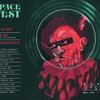One thing needs to be clear about Weval from the get-go: Merijn Scholte Albers (left) and Harm Coolen (right) are one crazy dedicated bunch. The Dutch electronic duo’s self-titled debut, released last year on German imprint Kompakt, though refined in execution, was conceived within pretty “hardcore” parameters. Working 24/7 in their home studio, they repelled themselves from listening to other records just so they could seize some kind of abstraction and originality. Even during the hour-long bike rides to their trusty attic, they made sure no other music could taint or distract their aural subconsciousness.
Mercifully, all that effort to maintain inventiveness was well worth it. The album’s tantalizing, supple inflections teeter within your headspace and propel your fleshy four-limbed exterior in equal measure. Masterfully and meticulously, Coolen en Scholte Albers made a fluid alchemy of their respective musical proclivities, which are pretty darn far-reaching to begin with. It’s one thing to splurge them all out on a canvas with gleeful abandon, another to melt them down into sleek shapes. This is music that opts for the latter, varnishing outside reference points very deliberately in favor of appealing to deeper, more visceral human impulses. Weval sidestep any obvious stylistic reference: their music simply takes hold of you. The duo applies faint melodies as the occasional carrot-on-stick, whilst maintaining your attention span with clever seductive progressions in both cadence and atmospherics.
If the recently released eight-minute ‘Metazoa’ indicates something, Weval aren’t exactly satisfied with sticking by what’s worked well for them thus far. The track further murks up any binaries of electronic and organic sounds, its climax more corrosive and gritty in texture. Consider ‘Metazoa’ a momentary snapshot of Weval’s rapid mutation as a potent live beast. Scholte Albers and Coolen’s growth from hands-on producers to electric live musicians makes Weval more dynamic and flexible than ever.
We meet at a quiet Panini place in Amsterdam, the room’s background music only barely audible. For good reason too: Scholte Albers explains that if the speakers play music at similar frequency as human speech, he becomes too disoriented to communicate well. There you go: having honed a keen producer’s ear isn’t always such a blessing. After saying goodbye to their beloved attic studio, both Scholte Albers and Coolen have been creating more on-the-go this year, sharing a new workspace with another great Dutch export, Klangstof. Despite a rather chaotic transition period, they appear content and assured with the direction Weval is headed next.
DiS: Working with a limited set-up, do you still try to achieve a polished result, or simply demo the rough ideas?
Harm Coolen: I really enjoy working with a limited set-up, for example at home or on the road, alternated with our current studio space where we record a lot of stuff. It’s actually very liberating to work with a small set-up sometimes, to limit yourself to the tools we started with: working with only a laptop. You can experiment with certain drum loops to an infinite degree. I believe Weval has become increasingly ‘demo-minded’. Before, we wanted each idea to bloom into a fully finished track, but now we enjoy maneuvering within the ‘idea-phase’ of a track a bit longer. The compulsion to finish something doesn’t demand all our focus. We like to keep ideas in a rough state, so you can still ‘feel’ the intent.
Merijn Scholte Albers: During our US tour last summer, we were able to book five days of studio time in LA, with just our live equipment at our disposal: two synths, sound card, mics, laptop and that’s it. Very basic. We were able to track some live-drums and nurture some new ideas. It’s nice to assess what you can come up with within a five-day timetable. If it were up to us, we could work on a track endlessly, but it’s nice to have that immediacy, the magic of what could happen in just a matter of hours. You can always go back to it and rationally gauge what to keep and what to scratch. You’re not so much preoccupied with building a track up meticulously with all kinds of nifty details.
That’s a nice perk to have, working without the pressure of having to finish something. As Weval, every session seems valuable because you can archive elements for later use. The drawback, potentially, is hoarding too many ideas. Is it a challenge now to look at your music’s essence without dissecting it to gazillion pieces?
Coolen: I think Weval upholds both sides of that. Having fun is, of course, the most important thing, but I feel, more than ever, we look at music conceptually. Probably increasingly so. You hear great songs, as in the songwriting sense, but sometimes a song’s appeal simply comes from the way it sounds. A beautiful track that’s produced like a James Blake-track doesn’t really interest me. By definition, I draw a line in the sand once certain music emulates other music. We both draw a lot of joy and effort from the quest for originality. We try to look for unusual combinations, and sometimes they don’t work. The other day, I tried to integrate this guitar part with electronic sounds. From the outset, I knew it was going to be tricky. In the end it backfired. But the point is: sometimes it does work, and it can blow your process wide open.
That being said, I don’t think we’re in the position to describe Weval as something completely original. But we do make a concentrated effort to be exactly that. Sometimes you have an idea that makes you swoon on the spot, but it sounds a little too R&B. It can be something that reminds you of another piece of music a little too much; something just short of another artist patenting this, yet he or she still has some sort of ‘righteous’ ownership of. Not to say that capturing something familiar isn’t worth pursuing too. But in our case, if that happens, it does so by accident. Chasing originality and inventiveness demands ninety percent of our work. The other ten percent is hatching ideas, without the contrived intent of “Will this work on the dance floor?”, or something along those lines.
Scholte Albers: Making something completely original is impossible anyway. Subconsciously, you always borrow from music you listened to in the past. When I was a kid, I listened to Michael Jackson a lot, and I think that pop sensibility still filters through in some shape or form. All these bits and pieces of music shape your musical DNA, from which you try to create something new out of. Once something is borrowed unabashedly from another genre, however, I’m turned off.
Weval’s playlist on Spotify is immensely eclectic, everything from psychedelic rock, jazz, techno to African funk. I discovered a lot of stuff here recently. The common trait is how everything just sounds so impeccable. I hear this in Weval’s music as well, just this very tactile quality that taps heavily into this immediate visceral joy.
Scholte Albers: The playlist represents all the music we enjoy listening to at the moment. We listen to a lot of other stuff, but most of that is pretty well known to a wider audience. So we assemble music we feel can reach other people in a positive and exciting way. It’s about helping people like yourself discover something new. But sometimes you rediscover a very famous song from the past with fresh ears. Like Nelly Furtado, for instance.
Oh yeah, ‘Maneater’ is a great track.
Scholte Albers: Yeah, exactly. When that song came out, obviously, I listened to pop music differently. I was a teenager, and that song was ‘just’ mainstream pop to my ears. You just asked us this question whether we listen to music differently as producers? Well, this a really good example of how much has changed in the ways I engage with music. I can learn to appreciate any type of music for its fundamental qualities without wondering about the various ways it can be pigeonholed. Whether I’m listening to obscure African jazz or mainstream pop, it can all achieve this immediate joy.
Coolen: We both have a broad taste in music, which is more common than ever nowadays. By those merits, the musical landscape has become total chaos. We never worry about abiding to the rules of jazz, hip hop or techno. I am often smitten by the way jazz drumming sounds, and I do love it when these disparate elements can exist side by side. But Weval wants to fight for something fresh and original sounding. Originality in itself, though, is a relative thing.
With the introduction of drummer Nicky Hustinx after the record came out, how does Weval plan to tango in the future between live-elements and studio magic? Will that burgeoning live dynamic trickle down into the records?
Coolen: I think that’s exactly what’s happening right now. We’ve recorded about fifteen demos very impulsively, adding live drums for the first time. It definitely sounds less electronic than our previous work. Initially, we were very much hands on producers, now we’re jamming and recording more. This gives us several options: do we keep this session intact for the record? Or is it better to emulate it on our own? But without question, the ideas are hatched more out of playing live. Which is a reason why our next album will sound very different from our first. The music resembles our live sound a lot more.
Scholte Albers: We don’t, however, record live takes with the intent of picking one and mixing that. The bits of recordings are manipulated or cut up to our liking afterwards.
Coolen: I really like the idea of combining those two worlds: the perfectionist tweaking and editing hand-in-hand with the spontaneity of live instrumentation. If I had to pick a dogma of some sort, that one feels the most fruitful right now. From the outset, we put emphasis on working predominantly with the computer, programming a lot. Now in hindsight of touring, I feel we’ve come a long way as musicians.
Relinquishing some of that “studio control” over your older stuff, in order to express these jolts of urgency on stage, how have you both experienced that development?
Scholte Albers: It’s something we really had to learn on the fly. Sure, we had the freedom in creating music, but with just the two of us, our live set was relatively safe. We were both pretty perfectionistic. But after a while, we got a bit sick of that. I remember being invited for a gig in Germany, with just one caveat: to do a more ambient, atmospheric set. For us, that was a welcome opportunity to do a complete overhaul. We prepared pretty thoroughly for that gig, abandoned the usual script, and surrendered ourselves to the moment. It felt so nice. Everything we did that night, with all the errors, it was a very direct connection. And the audience noticed this as well. You’re really doing this together, creating something unique to that night alone. I really like that idea.
We now tell this to our live drummer Nicky Hustinx as well: trust your instincts, take a risk every now and then. When you make a mistake, it just means you’re trying something new. I really love experiencing that tension myself. I think people can sense it when you’re complacent on stage. You want to transfer that excitement to the people who came to see you. Not to say that a calculated, assembly line-type of performance can’t be equally impressive; it just won’t hold my attention span for more than fifteen minutes.
Coolen: I feel you need to be a little bit “on edge”. That’s a different concept than, say, a perfect show with every note and stage banter premeditated to a tee. On the flip side, a gig like that doesn’t distract and can be very overwhelming too. Like an Ikea-closet, it’s rigid and carefully instructed, you know exactly how to execute from scratch. But for Weval, there’s always a bit of struggle at play. You have to learn to enjoy that.
I reckon that you have to make all the touring hassle worth it. I saw this picture of you two hauling all this gear in a busy train on your way to Primavera Sound. I’d be so stressed out keeping track of my possessions
Scholte Albers: I don’t feel stressed at all. It’s worth the logistic hassle when you get to do something on stage that really excites you. As opposed to building a closet and move on to the next destination.
Coolen: You can really lose yourself completely into all the work you put into it, and find creative ways to clear all the hurdles you encounter. It makes that time on stage all the more valuable in my opinion. That’s what it’s all about. That said, if you perform the same, well balanced and calculated show every time, it frees up energy to think about your plans after the show. But I agree, touring can be quite a hassle. You see a lot of airports, but strangely enough, things often turn out okay. At first I really detested seeing so many airports, but eventually you carve out your own comfort zone. But without any urgency from both the audience or us, indeed, you stop to wonder: is it worth all that time and energy? You can only work on your own part of that pact. Fortunately, we’ve been extremely lucky with our crowds so far. The magic isn’t always there, but luckily that doesn’t happen to us very often.
Scholte Albers: Sometimes, we don’t play a good show. And you know what? That can be fun too. As for Primavera, we were pretty giddy to play there. Sam Shepherd of Floating Points told me few weeks prior that Primavera was one of his best shows. Suffice to say, we got pretty amped up for it. Indeed, it’s a great festival, and the show was fun, and in hindsight we did pretty well. But not all gigs summon that unique energy. Sometimes that happens at more unexpected places, like in a small venue that holds barely a hundred people. In Aachen, Germany, we played one of our best gigs ever, on a Monday night no less. We thought: who would come out to see us? The venue there ended up being pretty crowded, but not totally packed. And we had an absolute blast there. The chemistry between us and the crowd happened there, and not at some famous venue or festival. And I really enjoyed that.
So what are the immediate plans for Weval going forward?
Scholte Albers: Well, our live show continues to grow and evolve. We want to experiment with new forms and sequencing for our upcoming Dutch shows. Of course, there are tracks that always work well live. But we put up a strong effort to make each show a different experience altogether.
Coolen: We want to raise the bar for ourselves, but also for the crowds. We want to build our set a bit more gradually and experiment with monotony without he music becoming dull. The tracks that we consider slam dunks tend to achieve what we want anyway. The big challenge now is to entice the crowd into the more tranquil moments.
Scholte Albers: In the future, I would definitely like to stretch the dynamics of Weval further: make the calm bits even calmer, allowing the heavier parts to pack even more of a wallop. I personally don’t respond well to ninety minutes of pure onslaught. So the pursuit of what’s still possible is always there.
Coolen: I think it can be very fun for a crowd if they allow themselves to be challenged a little more; that can be a scary thing too. You go on this journey together, with no guarantee of ending up in the same headspace. It helps to execute a good game plan, to know when to show restraint and when to go all-out. I think it’s a beautiful thing to allow yourself to be as minimalist as humanly possible, up to the point where you can hear a pin drop. To make people aware of their surroundings. Of course there are always outside factors at play: the acoustics of a venue, the time of day, whether or not people arrive at a show directly from work. That space of tranquility doesn’t present itself on its own. It’s the challenge of playing music, to somehow be pulled out of the day’s ratio.
Weval’s self-titled debut is out now via Kompakt. Weval will wrap their final batch of shows of 2017 in Greece, Belgium, France and The Netherlands, starting 1 December. See the full list of dates here.
Photo Credit: Nick Helderman
This interview was conducted in Dutch, then translated into English.






















